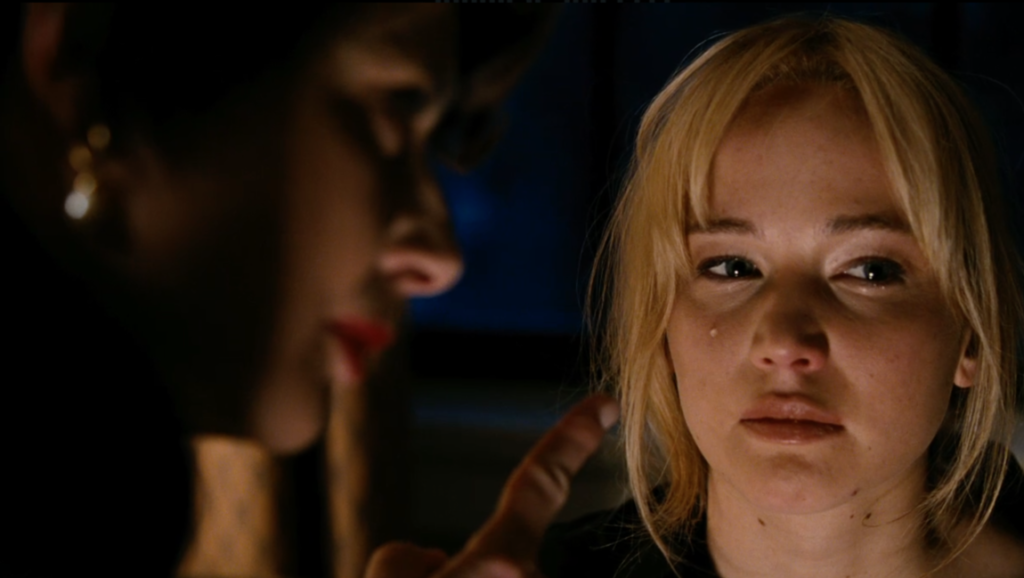Joy begins with an on-screen dedication to “daring women” and a scene from a hypothetical cheesy soap opera in which two women argue about the men in their lives, the love that they want, and the power that they deserve. It’s a surreal introduction to another of David O. Russell’s worlds, where outsized, almost folk-ish popular narratives (like those of a faded boxer’s comeback, or a team of con-artists) are populated with seriously neurotic, often very damaged people. Imagine an episode of ’80s prime-time soap Knots Landing or Dallas but with the emotional register of a Cassavetes film (even actual soap stars like Susan Lucci and Knots’ own Donna Mills cameo here). That’s what Russell is shooting for, but it consistently fails because he eschews both structure and any sort of formal cohesion, and in this case even his favorite lead actress Jennifer Lawrence (in her third consecutive collaboration with him) lets him down.
Joy is extremely loosely based on the life of Joy Mangano (Lawrence, but you knew that), inventor of the Miracle Mop, an apparently revolutionary mop that’s better than any other mop. Mangano lives in a crumbling house with her two children, her grandmother (Diane Lane), her possibly agoraphobic mother (Virginia Madsen), and aspiring singer ex-husband (Edgar Ramirez). Oh, and then ne’er-do-well dad (Robert De Niro) gets dumped by his girlfriend and moves in too. They’re a typical Russell ensemble: a shrill, shrieking bunch, constantly hollering at each other and haranguing Joy (despite her endless, selfless support) while she suffers in silence.
It’s decidedly odd that Russell, who once channeled some truly hilarious existential panic about the deleterious effects of capitalism and advertising on self-actualization in I Heart Huckabees, would make a film wherein a woman finds herself by becoming a great saleswoman.
Only once Joy lands the Miracle Mop on home-shopping TV channel QVC does the movie temporarily wake up, with a dreamlike sequence in which she becomes a spokeswoman for her product on live television. A rotating set flips through different domestic scenes (a living room, a kitchen), row after row of telephone operators spring into action behind the camera while the producer and network head (Bradley Cooper, who for some reason won’t stop talking about Barry Diller) looks on amazed and Joy shifts incrementally from terrified deer-in-headlights to confident host right in front of us (and her family watching at home). It’s a pretty wonderful oasis given that the rest of the film is barely controlled; Russell must simply let the actors do whatever they wish. The constant jagged cuts and rough ADR suggest that he figures it all out in the edit, and there’s no rhythm or consistent tone in the script or the camerawork. That leaves Lawrence rudderless, and she’s got no choice but to fall back on her two most reliable tricks: crying freak-outs and steely reserve.
Is this merely meant as an idiosyncratic drama of empowerment through hard work, intuition, and self-confidence? If so, it depicts very little of that simple concept. So much of the nuts-and-bolts of designing and building the mop are elided for cacophonous screaming matches and baffling characterizations (why is Joy’s half-sister Peggy so mean?). An out-of-nowhere finale involves Joy single-handedly intimidating what appears to be a mafia extortion attempt, and makes precious little sense. It’s also decidedly odd that Russell, who once channeled some truly hilarious existential panic about the deleterious effects of capitalism and advertising on self-actualization in I Heart Huckabees, would make a film wherein a woman finds herself by becoming a great saleswoman. The soap opera parody, the QVC fantasia, the domestic prison, the mob shakedown; there’s nothing unifying Russell’s typically hyperactive shifts beyond the desire to get inside Joy’s head, but that isn’t possible when everything else seems so arbitrary.

